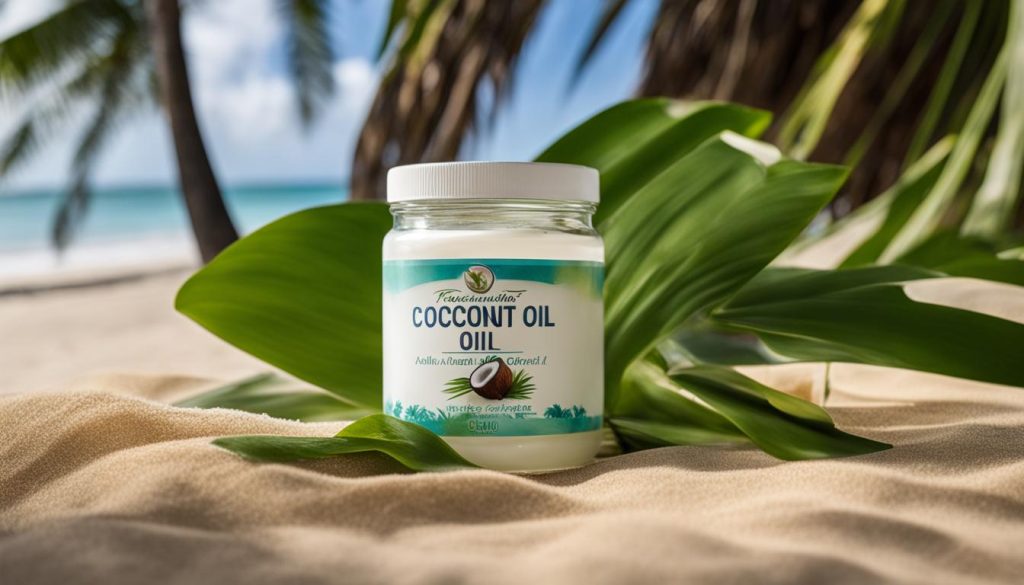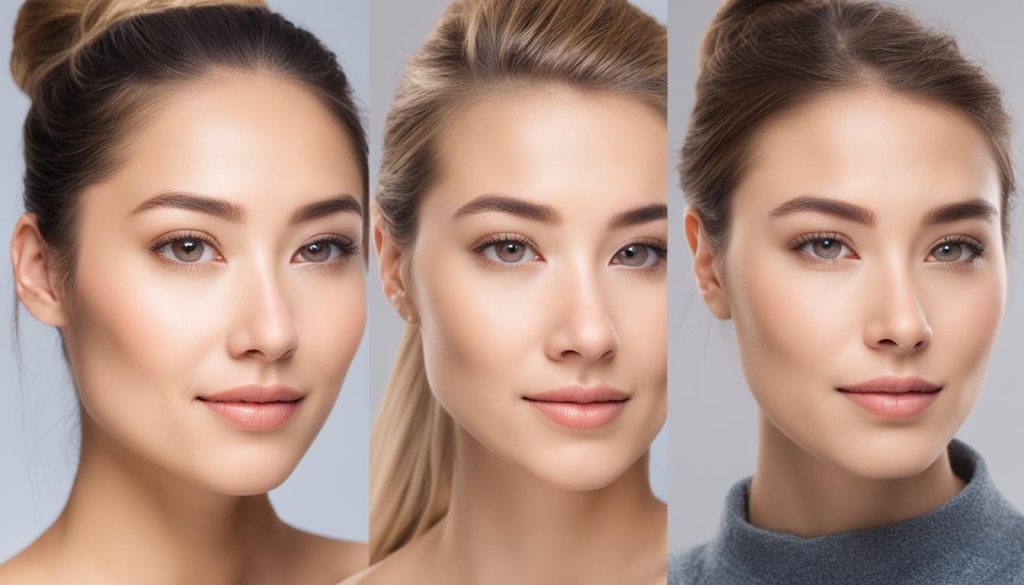Welcome to my definitive guide on how to use coconut oil on the face. If you’re seeking methods to enhance your beauty routine with natural products, you’ve undoubtedly come across countless recommendations for coconut oil for skin. I, too, have delved into the remarkable benefits of this versatile oil and have uncovered ways to harness its full potential for beauty and skincare. Due to its nourishing fatty acid composition, coconut oil serves not just as a hydrator but also as a protector against environmental aggressors, locking in moisture and soothing the skin.
Whether it’s to handle dry patches with a gentle touch or to support your skin’s overall health, learning how use coconut oil for skin can transform your beauty routine. The coconut oil benefits beauty aficionados in multifaceted ways, making it a staple in many skincare arsenals. Now, let me walk you through some of the nuances of integrating coconut oil into your facial skincare regimen.
Key Takeaways
- Discover how to effectively moisturize your face using coconut oil.
- Learn about the protective barrier coconut oil creates to retain skin moisture.
- Understand the antimicrobial properties that make coconut oil a multifunctional beauty staple.
- Gain insight into the convenience of coconut oil’s semi-solid state for topical application.
- Explore the added benefits of coconut oil for areas beyond the face, like cuticles and lips.
The Transformative Benefits of Coconut Oil for Skin Care
As a beauty aficionado, I’ve long been captivated by the incredible versatility and efficacy of coconut oil in skin care. Dubbed a miracle ingredient, coconut oil beauty secrets have permeated cultures worldwide, offering a treasure trove of benefits that cater to a myriad of skin concerns. The beauty uses of coconut oil are as extensive as they are impressive, working harmoniously to enhance complexion and skin health.
One of the most celebrated coconut oil uses beauty advocates rave about is its profound hydrating properties. Having personally included coconut oil for beauty in my daily regimen, I’ve observed a notable improvement in my skin’s moisture levels. It’s no surprise that those with dry or normal-to-dry skin can reap significant benefits from the inclusion of coconut oil in their skin care routine.
- **Reduction of Inflammation**: I’ve noticed a calming effect on inflamed areas, as coconut oil is known to alleviate redness and swelling.
- **Protection from Free Radicals**: Aiding in neutralizing harmful environmental elements, coconut oil serves as a guardian against the aging effects of oxidative stress.
- **Supportive Barrier Function**: By fortifying the skin’s natural barrier, coconut oil helps maintain essential hydration, ensuring that my skin remains plump and resilient.
- **Collagen Production**: The use of coconut oil may also play a role in stimulating collagen synthesis, which can aid in the reduction of fine lines and promote a youthful glow.
- **Lightening of Dark Patches**: The oil’s natural lightening capabilities have worked wonders on areas of hyperpigmentation, offering a more even skin tone without harsh chemicals.
The transformative qualities of coconut oil extend beyond simple hydration; its multifaceted benefits make it a powerhouse in the pursuit of beauty and wellness. Embracing coconut oil for beauty, I’ve leveraged its rich texture and nourishing compounds to unlock a healthier, more radiant complexion that resonates with vitality.
How to Use Coconut Oil on the Face for Overnight Hydration
Unlocking the full benefits of coconut oil for face care requires a simple yet effective nightly routine. I’ve mastered the art of using coconut oil for facial moisturization, and my skin has never looked more radiant. Through careful application and understanding its natural properties, I’ve learned how to use coconut oil on the face for radiant skin, and I’m excited to share these insights with you.
Liquefying and Applying Coconut Oil
Before I head to bed, I warm a small amount of coconut oil between my hands. Its transformation from a semi-solid to a liquid oil makes it easy to apply a thin, even layer onto my face, neck, and chest. This simple method allows the oil to impart its moisturizing benefits throughout the night, offering deep hydration and the benefits of using coconut oil on the face overnight.

Ensuring Proper Absorption for Maximum Benefit
Once I’ve applied the coconut oil, I gently pat my skin with a soft tissue to remove any excess. This step is crucial to ensure that the remaining oil is just enough to form a protective but breathable layer that won’t clog my pores while I sleep. The result in the morning is soft, supple skin that truly showcases the overnight benefits of coconut oil for the face.
Tips for Using Coconut Oil on Sensitive Areas
For the tender area under my eyes and my lips, coconut oil has been a gentle and effective moisturizer. I dab it lightly on these regions, appreciating its gentle nature. In my experience, organic, unrefined, virgin, or extra virgin coconut oil variants are the most nurturing and least likely to cause any irritation, affirming their place in my nightly skincare regimen.
- Warm the coconut oil between your hands before application.
- Apply a thin layer to the face, neck, and chest.
- Use a tissue to remove excess oil.
- Gently apply on sensitive areas such as under the eyes and lips.
- Choose high-quality coconut oil variants for the best results.
Identifying the Best Type of Coconut Oil for Facial Use
Understanding how to use coconut oil on the face begins with selecting the right type of oil. Based on my experience with coconut oil for skin care, let me guide you through the kind of coconut oil that is good for your skin and hair and can contribute to your anti-aging routine.
- Choose Organic: Always select organic coconut oil, as it’s made without potential harmful pesticides and ensures a purer product for your skin.
- Virgin or Extra Virgin Labels: These terms indicate that the coconut oil is unrefined and retains a maximum level of beneficial nutrients.
- Prefer Unrefined: Unrefined coconut oil has not been bleached or deodorized, preserving its natural antioxidants and lauric acid, which is known for its antibacterial properties.
While many might wonder, “Is coconut oil good for your skin and hair?” the answer largely depends on the type you choose. Steer clear of refined coconut oil, as it often undergoes processing that can strip away much of its natural goodness, making it less ideal for facial skin care.

Incorporating coconut oil into your skin care regimen can be transformative, especially if you’re aiming for natural anti-aging solutions. Emphasizing the use of unrefined, organic coconut oil can help to ensure that your skin reaps all the nutritive benefits this miraculous oil has to offer. So next time you’re browsing for skincare options, remember that the best type of coconut oil for facial and hair care is the one closest to its natural state.
How to Use Coconut Oil on the Face as a Natural Cleanser
Transforming my daily skincare routine, I’ve discovered the versatility of coconut oil not only for dry skin but also its efficacy for oily and combination types. As a natural face cleanser, coconut oil has become my go-to for a radiant, glowing complexion. Let me guide you through the proper ways to use this wonderful ingredient.
The Correct Way to Melt and Apply Coconut Oil as a Cleanser
Melting coconut oil for a cleansing ritual is quite simple. First, I take a generous amount of coconut oil—using only the best organic, unrefined kind—and warm it between my palms until it turns liquid. Gently, but thoroughly, I massage it over my face, feeling how it lifts away impurities. It’s important not to rush this process; the melting and application should be as soothing for the mind as it is cleansing for the skin.
To remove the oil, I press a warm, wet washcloth against my skin, holding it for a moment before gently wiping. This method ensures that coconut oil’s hydrating benefits are maximized without leaving any oily residue. Remarkably, this technique avoids drying out the skin, which can happen with other cleansers – and it works wonders for all skin types.
Combining Coconut Oil with Other Natural Ingredients for Enhanced Cleansing
For days when my skin needs a little extra exfoliation, I like to mix coconut oil with natural granular substances. Incorporating sugar or fine sea salt can elevate the cleansing experience, giving me a homemade exfoliant that’s both gentle and effective.
- For Glowing Skin: I blend coconut oil with tiny amounts of sugar. This combination helps to slough off dead skin cells and reveal a brighter skin tone.
- For Gentle Exfoliation: Mixed with sea salt, coconut oil becomes a mineral-rich scrub, which leaves the skin smooth without feeling stripped of moisture.
These DIY blends are perfect for massaging into my skin, targeting the areas that need attention, and bringing about a refreshed and glowing complexion.
My journey in using coconut oil as a cleanser has taught me not only about skin care but also about taking a moment for myself. Whether you have dry, oily, or maturing skin, I believe coconut oil can be a game-changer for your skincare regimen – one that’s natural, effective, and nurturing.
Coconut Oil and Acne: Understanding Comedogenic Effects
When it comes to coconut oil for skin care, its popularity is undeniable. Many claim that it serves as an excellent moisturizer and can improve skin health. However, I must emphasize that some caution is needed, especially for those with certain skin types. Coconut oil has a comedogenic nature, which means it’s possible for it to clog pores, potentially leading to acne outbreaks for individuals with oily or combination skin. This doesn’t mean it’s off-limits for everyone but being aware of your skin’s needs and reactions is crucial when introducing new products into your regimen.
On a positive note, not all experiences with coconut oil for acne treatment result in negative outcomes. In fact, some individuals might experience beneficial effects, noticing an improvement in their skin’s overall appearance. Dry, rough patches might meet their match with the emollient properties of coconut oil, finding solace in its rich, moisturizing virtues. But, if you have a history of long-term antibiotic use or a weakened immune system, consider avoiding coconut oil as a facial treatment to preclude the risk of fungal or bacterial complications.
For those of you with known allergies to coconuts or a history of related sensitivities, it’s prudent to exclude coconut oil from your beauty arsenal. Always prioritize your safety and well-being over trends. While coconut oil for skin boasts many advantages, it’s not universally suitable for all skin conditions, especially when it comes to acne. Be mindful and consult with a dermatologist to understand better whether coconut oil is the right choice for you and your hair, whether for its potential moisturizing benefits or its role in a comprehensive acne treatment strategy.
FAQ
How do I use coconut oil on my face?
To use coconut oil on your face, warm a small amount between your hands to liquify it, then gently massage it onto your face. You can rinse it off with warm water or leave it overnight for deeper moisturization. Always do a patch test first to ensure your skin reacts well to coconut oil.
Can coconut oil really improve my skin?
Yes, coconut oil can improve the appearance of your skin by hydrating, reducing inflammation, and protecting against damage from free radicals. It may also promote collagen production and lighten dark patches, resulting in smoother and more even-toned skin.
What type of coconut oil is best for use on the face?
For facial use, it’s best to choose organic, unrefined, virgin, or extra virgin coconut oil. These forms are produced without harsh chemicals, preserving more beneficial fatty acids and compounds.
Is coconut oil suitable for all skin types?
Coconut oil is particularly beneficial for dry or normal-to-dry skin types due to its hydrating properties. However, for oily or acne-prone skin, proceed with caution as it is comedogenic and can clog pores, potentially leading to breakouts.
Can coconut oil be used as an overnight face treatment?
Yes, coconut oil can be used as an overnight treatment. Apply a thin layer on your face before bed, allowing it to absorb into the skin for deep hydration. Use a soft tissue to remove any excess oil to prevent clogged pores.
How can I use coconut oil as a natural face cleanser?
Melt a small amount of coconut oil by warming it in your hands, then massage it onto your face to dissolve makeup and impurities. Wipe it off gently with a warm, wet cloth to leave your skin feeling clean and moisturized.
What are the benefits of using coconut oil on my face overnight?
Overnight use of coconut oil on your face can deeply moisturize your skin, support the skin’s natural barrier, and provide long-lasting hydration. This can lead to a more supple and glowing complexion in the morning.
Can coconut oil help with wrinkles and signs of aging?
Coconut oil can be beneficial for reducing the appearance of fine lines and wrinkles due to its potential to promote collagen production and moisturize the skin, which may make the skin look plumper and more youthful.
Are there any side effects of using coconut oil on the face?
While coconut oil is generally safe for the skin, it can cause clogged pores, acne breakouts, or allergic reactions in some individuals. It is not recommended for those with a history of long-term antibiotic usage, weakened immune systems, or those allergic to coconuts.
Can I use refined coconut oil on my face?
It is not recommended to use refined coconut oil on your face, as it may contain fewer skin-nourishing elements and could be harsher on the skin compared to unrefined coconut oil.






